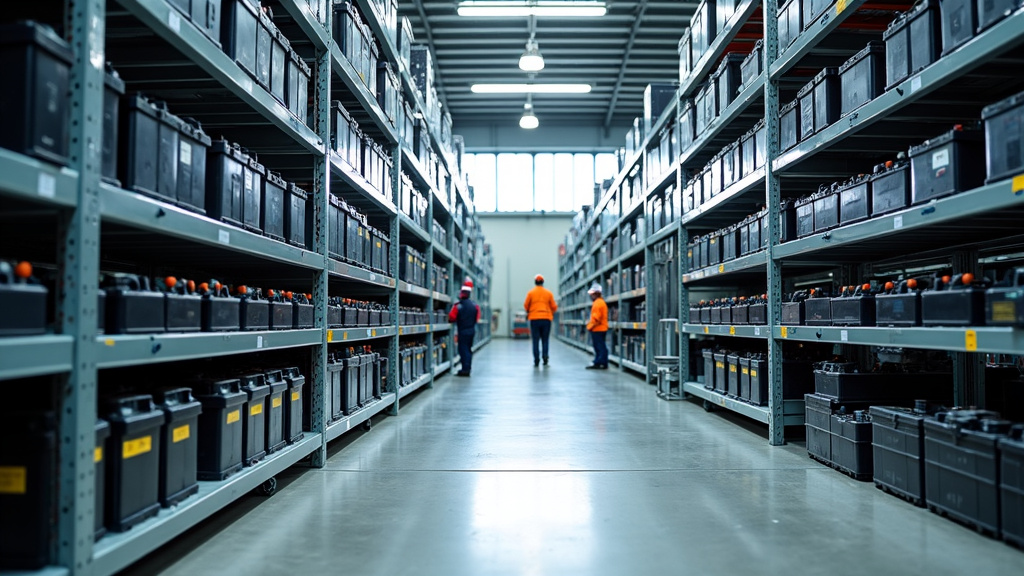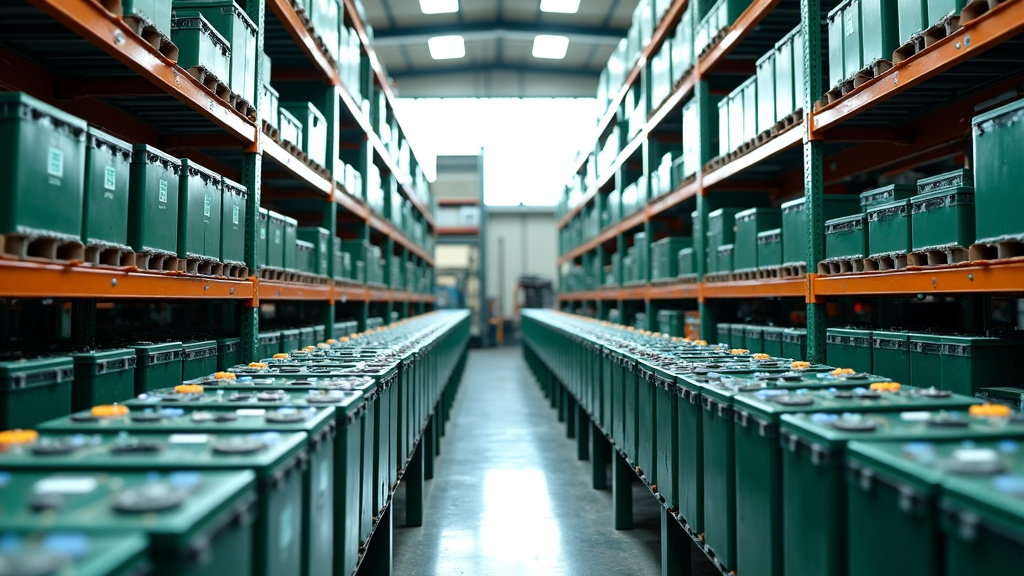5901 Botham Jean Blvd, Dallas, TX 75215
Recycling Used Lead-Acid Auto Batteries: A Sustainable Solution
March 28, 2025Did you know that a single improperly disposed lead-acid auto battery can contaminate 25,000 liters of water? This fact highlights the critical importance of recycling used lead-acid auto batteries, a process essential not only for environmental protection but also for conserving our planet’s finite resources.
Lead-acid batteries, the essential components powering our vehicles, contain hazardous materials that can harm ecosystems if not managed properly. Fortunately, we can take action. By embracing recycling, we can transform these potential environmental threats into valuable resources, significantly reducing the need for raw materials and minimizing ecological damage.
Imagine a world where the lead in your car battery doesn’t end up contaminating soil and groundwater but instead gets a new lease on life in another battery. This is not just a dream—it’s the reality of effective lead-acid battery recycling. In the United States alone, this practice diverts 1.7 million tons of lead from landfills annually, making a substantial impact!
The Environmental Impact of Lead-Acid Batteries

Lead-acid batteries, essential for powering vehicles and backup systems, pose significant environmental risks if not managed properly. These batteries contain toxic materials like lead and sulfuric acid, which can have devastating effects on ecosystems and human health when improperly disposed of.
The environmental hazards of lead-acid batteries primarily stem from their potential to contaminate soil and water sources. When batteries end up in landfills or are improperly discarded, the lead and acid can leach into the surrounding environment. According to the U.S. Environmental Protection Agency, a single car battery can contaminate up to 25,000 liters of water if not recycled correctly.
Lead contamination from improperly disposed batteries can have far-reaching consequences. It can render agricultural land unusable for decades, disrupting food production and local economies. A 2021 study in Bangladesh revealed that rice paddies near informal battery recycling sites had lead concentrations 80 times above World Health Organization limits, highlighting the severe impact on food safety and human health.
The Importance of Proper Recycling
Proper recycling of lead-acid batteries is crucial for mitigating these environmental risks. When recycled correctly, nearly 99% of a lead-acid battery can be recovered and reused, making it one of the most recyclable consumer products. This high recycling rate not only prevents toxic materials from entering the environment but also conserves valuable resources.
The recycling process involves breaking down the batteries and separating their components. The lead is melted and purified for reuse in new batteries or other products. The plastic casings are cleaned, shredded, and repurposed into new battery cases or other plastic items. Even the sulfuric acid is neutralized and can be converted into useful products like sodium sulfate for detergents.
By recycling lead-acid batteries, we significantly reduce the need for new lead mining, which is both energy-intensive and environmentally damaging. According to the Battery Council International, recycling lead requires 35-40% less energy than producing new lead from ore, resulting in lower greenhouse gas emissions and a smaller carbon footprint.
Comparative Environmental Impact
The difference between recycled and non-recycled batteries’ environmental impact is stark. Properly recycled batteries prevent the release of toxic materials into the environment, conserve natural resources, and reduce energy consumption. In contrast, non-recycled batteries can lead to severe soil and water contamination, posing long-term risks to ecosystems and public health.
To illustrate, the EPA estimates that recycling prevents 2.4 million metric tons of lead pollution annually – equivalent to the contamination potential of 150,000 Olympic-sized pools. This underscores the critical role of recycling in environmental protection.
While the recycling rate for lead-acid batteries is impressively high in many developed countries, challenges remain in regions with less stringent regulations. Improving global recycling practices and infrastructure is essential to maximize the environmental benefits of lead-acid battery recycling and minimize its potential hazards.
Benefits of Recycling Used Lead-Acid Auto Batteries

Recycling lead-acid batteries is not just responsible—it offers significant environmental and economic benefits. From conserving valuable resources to reducing pollution, the advantages extend well beyond the recycling plant. Here’s why this process is vital for our planet and economy.
Conserving Natural Resources
Recycling lead-acid batteries significantly conserves natural resources. By reclaiming materials from used batteries, the need for raw material extraction is reduced. According to Global Batteries, recycling these batteries conserves resources and cuts energy use by 50% compared to raw material production.
This conservation effort extends beyond lead. The plastic casings, sulfuric acid, and other components are recoverable and reusable. This exemplifies how recycling can greatly decrease our dependence on mining and drilling for new materials.
Consider this: each recycled battery recovers 15-20 pounds of lead and 5-8 pounds of plastic, keeping substantial material in circulation and out of landfills. The recycling process even recovers sulfuric acid, which can be neutralized and converted into useful products like sodium sulfate for detergents.
| Material | Recycling Recovery Rate | New Production Energy Requirement |
| Lead | 99% | 35-40% less energy than new production |
| Plastic | Reused in new battery casings | Requires new raw material extraction |
| Sulfuric Acid | Neutralized and reused as sodium sulfate | Requires chemical processing |
Reducing Greenhouse Gas Emissions
Lead-acid battery recycling significantly reduces greenhouse gas emissions compared to manufacturing new batteries from scratch. The Environmental Protection Agency estimates that recycling these batteries prevents the release of 2.4 million metric tons of carbon dioxide equivalent annually—equivalent to taking over 500,000 cars off the road for a year!
This reduction is due to the lower energy requirement for recycling compared to primary production. Additionally, by reducing the need for raw material extraction and processing, emissions are cut at multiple stages of the battery lifecycle.
Preventing Hazardous Waste Accumulation
Lead-acid batteries contain materials that can be extremely harmful if released into the environment. Proper recycling prevents a significant amount of hazardous waste from contaminating soil and water resources.
With a recycling rate of over 99% in the United States, lead-acid batteries keep millions of pounds of toxic materials out of landfills each year. This high recycling rate prevents potential lead contamination and the leaching of sulfuric acid into ecosystems.
Modern recycling facilities are equipped with advanced pollution control systems, capturing 99.9% of potential emissions, ensuring that the recycling process itself does not contribute to environmental contamination.
Supporting the Circular Economy
Lead-acid battery recycling embodies the principles of a circular economy, where resources are kept in use for as long as possible, extracting maximum value and then recovering and regenerating products at the end of their service life.
Lead-acid batteries are a prime example of this concept. Nearly every component of a used battery can be recycled to manufacture new ones, with a new lead-acid battery typically containing 80% recycled materials.
Moreover, lead can be recycled indefinitely without loss of quality, making lead-acid batteries a standout in sustainable product design. It’s about reimagining how we use and reuse our resources.
The circular economy model of lead-acid battery recycling creates jobs, stimulates local economies, and reduces reliance on raw material imports. It benefits the environment, the economy, and energy security.
Recycling lead-acid batteries offers numerous benefits beyond waste reduction. From conserving natural resources and reducing greenhouse gas emissions to preventing hazardous waste accumulation and supporting a circular economy, this process is crucial for building a more sustainable future. As recycling technologies improve, the positive impact of lead-acid battery recycling will continue to grow.
Driving Towards a Greener Future with Responsible Battery Recycling

Responsible battery recycling is more than just regulatory compliance; it is a proactive approach to environmental stewardship. Partnering with experienced recyclers like Okon Recycling ensures that hazardous materials are handled safely, minimizing environmental risks while maximizing resource recovery.
The impact of proper lead-acid battery recycling extends beyond our immediate surroundings. It reduces greenhouse gas emissions, prevents soil and water contamination, and supports the circular economy. Every recycled battery helps lessen our reliance on raw materials and energy-intensive manufacturing processes.
As consumers and businesses, we have the power to make a difference. By prioritizing responsible battery recycling, we are actively participating in environmental protection and resource conservation. It is a straightforward yet powerful way to contribute to a greener, more sustainable world for future generations.
Don’t let used batteries harm the environment. Take action today by responsibly recycling your lead-acid batteries. For expert recycling solutions and to learn more about making a positive environmental impact, contact Okon Recycling at 214-717-4083.
